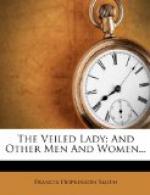To the inmates of the room the boy was known as “Joe” or “Quinn” or “Sonny.” To the man with the half-moon shade over his eyes he was “Say” or “That Damned Kid.” High-strung, high-pressure editors omit the unnecessary, condensation being part of their creed.
Up in the Franconia Notch, in a little hollow under White Face and below Bog Eddy, Joe had been known as “Jonathan’s boy,” Jonathan being the name his father went by, the last half never being used,—there being but one “Jonathan”—the one whom everybody loved.
The cabin was still standing, where Joe was born, —a slant of logs with a stone chimney and some out-buildings; and his old father was still alive, and so was his mother and his little “Sis.” Summer mornings the smoke would curl straight up from the rude stone chimney, catch a current of air from the valley, and stretch its blue arms toward the tall hemlocks covering the slope of the mountain. Winter mornings it lay flat, buffeted by the winds, hiding itself later on among the trees. Joe knew these hemlocks, —loved them,—had hugged them many a time, laying his plump, ruddy cheek against the patches of cool moss velveting their sides. “Nothin’ like trees,” his old father had told him,—“real human when ye know ’em.”
To-night, as he lay stretched out on the mail sacks, his ears unlatched, listening for the sound of the night city editor’s bell, or his gruff “Say, you!” his mind kept reverting to their bigness and wide, all embracing, protecting arms. A letter from Jonathan received that morning, and still tucked away in his inside pocket, had revived these memories.
“They’ve started to cut roads, son,” it read. “I was out gummin’ yesterday and got up under White Face. Won’t be nothing left if they keep on. Cy Hawkins sold his timber land to them last winter and they’ve histed up a biler on wheels and a succular saw, and hev cleared off purty nigh every tree clean from the big windslash down to the East Branch. It ain’t going into building stuff; they’re sending it down to Plymouth to a pulp mill and grinding it up to print newspapers on, so the head man told me. Guess you know all about it, but it was news to me. I told him it was a gol-darn-shame to serve a tree so, being as how trees had feelings same as men, but he laughed and said it warn’t none of my bizness, and I guess it ain’t. Beats all what some folks will do for money.”
Joe thought so too,—had been thinking so ever since he broke the seal of the letter that the postmaster at Woodstock had directed for his father. “Dad’s right; trees have feelings,” he kept repeating to himself. And, as to being human, he could recall a dozen that he had talked to and that had talked back to him ever since he could remember. His father had taught him their language on the long days when he had trailed behind carrying the gum bag or had hidden in the bushes while the old man wormed himself along, his rifle in the hollow of his arm, or when the two lay stretched out before their camp fire.




